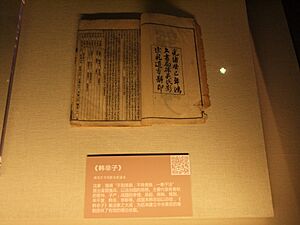Han Feizi facts for kids

A late 19th century edition of the Hanfeizi by Hongwen Book Company
|
|
| Author | Han Fei |
|---|---|
| Original title | 韩非子 |
| Country | China |
| Language | Chinese |
| Genre | Chinese classics |
|
Publication date
|
BC/BCE |
| Han Feizi | |||||||||||||||||||||||||||||
|---|---|---|---|---|---|---|---|---|---|---|---|---|---|---|---|---|---|---|---|---|---|---|---|---|---|---|---|---|---|

|
|||||||||||||||||||||||||||||
| Traditional Chinese | 韓非子 | ||||||||||||||||||||||||||||
| Simplified Chinese | 韩非子 | ||||||||||||||||||||||||||||
| Literal meaning | "[The Writings of] Master Han Fei" | ||||||||||||||||||||||||||||
|
|||||||||||||||||||||||||||||
Han Feizi was an important Chinese thinker. He lived a long time ago, from about 280 BC to 233 BC. He was a master of something called Legalism.
Legalism is a way of thinking about how to make a country strong and orderly. It focuses on having very clear laws. It also believes in strict rules for everyone. A powerful leader makes sure everyone follows these rules.
Contents
Han Feizi's Life Story
We don't know every detail about Han Feizi's life. Historians have gathered information from old writings. But some parts of his story are still a mystery.
Han Feizi came from a noble family. They lived in the state of Han. This was one of many kingdoms fighting during the Warring States period. His family was important, but we don't have exact dates for his birth or death. Most historians think he was born around 280 BC. He likely died around 233 BC.
He was a very smart student. He learned from two famous teachers: Xunzi and Shang Yang. Han Feizi took ideas from both of them. He then combined these ideas in his own special way.
Han Feizi's Writings
Han Feizi's most important gift to history is his collection of writings. These are essays and articles. They cover many topics about government, law, and society.
His writing style is very clear and direct. He used many stories and comparisons to explain big ideas. This made them easier to understand. For example, he might compare a ruler to a farmer. Or he might compare a government to a well-organized army.
Key Ideas from Han Feizi
Han Feizi had strong beliefs about how a country should be run.
Importance of Laws
Han Feizi believed that clear, written laws were key for a stable society. Everyone, from the ruler to the common person, should know the laws. And everyone should follow them. He thought laws should apply equally to all people. There should be no favorites.
Strict Punishments
He believed that breaking the law should have quick and tough punishments. This would stop people from doing bad things. It would also keep order. He did not believe in being too soft. He argued that being too forgiving would make laws weak.
The Ruler's Power
Han Feizi thought the ruler should have total power. The ruler should make all the final decisions. Everyone should obey the ruler's commands without question. He argued that a weak ruler would lead to chaos and disorder.
Controlling Officials
Han Feizi knew that government officials could become corrupt. They might also misuse their power. He suggested ways to control officials. For example, using spies and checks and balances. This would make sure they followed the law.
Choosing Officials Wisely
Even with a powerful ruler, Han Feizi believed officials should be chosen for their skills. Their abilities and merit should matter most. Not their family connections or social status. He wanted a system where talented people could move up based on what they achieved.
Han Feizi's Influence
Han Feizi's ideas had a big impact on Chinese history. Rulers and officials studied his writings for hundreds of years. His ideas shaped how governments were run.
Even though Legalism later became less popular, many of his ideas are still important today. His focus on clear rules and fair enforcement is a principle found in many modern legal systems.
Images for kids
 | Mary Eliza Mahoney |
 | Susie King Taylor |
 | Ida Gray |
 | Eliza Ann Grier |



